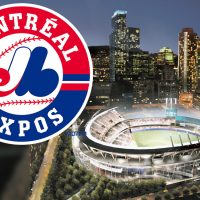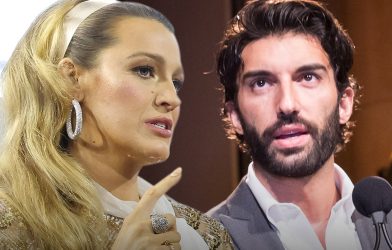
In the 1990s, the Montreal Expos were struggling. Their decrepit stadium resulted in disastrous attendance numbers, and the loss of crucial ticket and concession revenue led to a steady stream of the team’s most talented players walking away the second they hit free agency. The 1994 player’s strike, which cancelled the last two months and the entire postseason, wiped out what had easily been the best season in team history–a nail simply too large to remove from the lid of the Expos’ coffin.
A glimmer of hope shone upon the city in 1998 with the announcement of Labatt Park, a new downtown home for the Expos, and a $100 million, 20-year sponsorship deal with the Labatt Brewing Company. As Expos president Claude Brochu explained at the time, this deal would have had Labatt paying the team $5 million annually from 2001 to 2021. The agreement included $40 million for the naming rights to the new stadium and $60 million as the team’s lead sponsor. Brochu noted that the $5 million per year alone was not expected to make the Expos championship contenders (the Expos perennially had the lowest payroll in Major League Baseball) but was instead seen as a crucial step toward improving the team’s financial stability over the long term.
LINK: Montreal Expos logo and uniform history
The selected site for the new open-air, natural grass stadium was two blocks south of the Molson Centre, home to the Montreal Canadiens, bordered by Rue St. Jacques, Rue de la Montagne, Rue Notre Dame, and Rue Peel, an easily accessible location. The AXOR Group and Provencher Roy & Associés Architects developed the design of the new ballpark. It featured an oval-shaped structure with a transparent outer glass wall offering a panoramic view of Montreal’s cityscape.

The stadium capacity was set for 36,287 seats, which was incredibly small for a new ballpark at that time, with an option to expand by another 2,000 with right-field bleachers. The stadium layout consisted of 64 executive boxes, two dugout boxes with 18 seats each, a 257-seat Diamond Club between the dugouts, and a party room located beyond the right-field wall (oh, the parties we could’ve hosted there…).
Since 1977, the Expos had been tenants at Olympic Stadium, considered a state-of-the-art facility when it opened for the 1976 Summer Olympics. However, poor construction (the stadium actually began to fall apart in 1991, forcing the team on the road for a month), a lemon of a retractable roof, poor sightlines, and an incredibly uninviting atmosphere for baseball resulted in an often half-empty (on a good day) stadium.

Shortly after the initial presentation of the new ballpark, the Expos got a new owner, Jeffrey Loria, who again presented the Labatt Park proposal in February 2000. Loria planned for the team to move into the state-of-the-art open-air stadium by 2002. Expos president David Samson surprised many when he clarified that the stadium’s naming rights were still open and that no contract had been signed with Labatt’s. He had no hesitation in publicly speculating that Molson, one of Labatt’s main competitors, might consider purchasing the rights. The pressure worked because the original $100-million deal over 20 years was finally confirmed eight weeks later.
Things suddenly worsened in January 2001 when the partnership between Labatt and the Expos abruptly ended. Labatt, the Expos’ principal sponsor for the past 15 years, decided to sever the relationship, citing the need to achieve a better return on their marketing investment elsewhere. The decision was a significant blow to the Expos, resulting in a loss of $2 million in annual sponsorship revenue.
Paul Wilson, Labatt’s vice president of public affairs in Quebec, stated that business considerations drove the decision. He emphasized that the brewery had no choice but to sever ties after the new ownership failed to secure local broadcast deals and make progress on the stadium project. Jeffrey Loria, who acknowledged the importance of the brewery’s support over the years, met Labatt’s withdrawal with regret but downplayed the significance of their decision, asserting that the Expos would simply seek new complementary sponsorship partners.


As 2001 progressed, it became clear that Jeffrey Loria was no longer interested in securing a solid future for the Expos, with his attention shifting towards acquiring the equally struggling Florida Marlins. A complicated series of negotiations, orchestrated in part by MLB Commissioner Bud Selig, began to unfold. The plan, approved in January 2002, involved Loria selling the Expos to Major League Baseball, Marlins owner John Henry purchasing the Boston Red Sox, and finally Loria taking control of the Marlins. A contraction plan that would have eliminated the Expos and the American League’s Minnesota Twins for 2002 was also approved by the 29 team owners but ultimately blocked by the player’s union.
With MLB taking over the Expos, the team’s future in Montreal was in severe doubt, and any plans to build a new stadium were quickly abandoned. While under MLB ownership, the Expos were forbidden from taking on any additional player salary, effectively ending any hope of fielding a competitive team. The Expos would play out the 2002, 2003, and 2004 seasons under MLB’s ownership before being relocated to Washington, D.C., where they were rebranded as the Washington Nationals.

Of course, this rendered the Labatt Park proposal very obsolete. In a final blow to the project’s legacy, the original model of the proposed ballpark (which had since been donated to the Canadian Baseball Hall of Fame) was destroyed by vandals in 2005.
Jeffrey Loria’s Marlins would win the World Series just one year after he left the Expos in 2003. And those former Expos, now playing in Washington, would win a World Series championship in 2019 during the 50th anniversary of the Expos’ first season.










Comments are closed